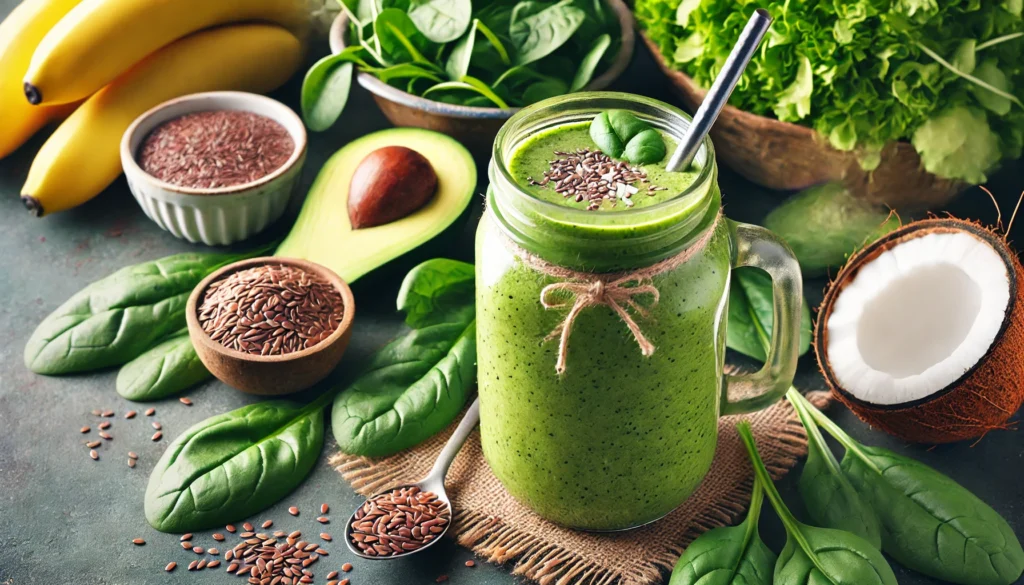In the intricate dance of health and wellness, hormones play a pivotal role. These chemical messengers regulate everything from metabolism to mood, and their balance is crucial for optimal health. While the modern lifestyle and dietary choices can often wreak havoc on hormonal harmony, nature offers a bounty of solutions, notably in the form of smoothies. By blending the right ingredients, you can craft delicious drinks that help balance hormones naturally. Let’s delve into the science behind these hormonal drinks and explore recipes that can support your endocrine system effectively.
You may also like: Best Vegetables for Hormonal Health Benefits
Understanding Hormonal Imbalance
Hormones are produced by various glands in the body and travel through the bloodstream to tissues and organs, dictating processes such as growth, metabolism, and mood regulation. Imbalances can occur due to factors like stress, diet, pollution, and lifestyle choices. Symptoms of hormonal imbalance may include fatigue, weight gain, mood swings, and sleep disturbances. Addressing these imbalances naturally can often be more sustainable than pharmaceutical alternatives.
Common Causes of Hormonal Imbalance
Stress is a major contributor to hormonal imbalance. When stressed, the body produces cortisol, which can disrupt other hormone levels. Additionally, a diet high in processed foods and sugars can lead to insulin resistance, affecting hormones like estrogen and testosterone. Environmental pollutants, such as endocrine disruptors found in plastics, can also mimic hormones and interfere with natural hormone production. Understanding these causes can help in adopting preventive measures.
Recognizing Symptoms Early
Recognizing the symptoms of hormonal imbalance early can lead to more effective interventions. Fatigue, for instance, might not just be a sign of overwork but could indicate thyroid hormone issues. Similarly, sudden weight changes and mood swings can suggest imbalances in insulin or cortisol. Keeping a journal of symptoms and lifestyle habits can aid in identifying patterns and triggers, making it easier to address the root causes.
The Role of Lifestyle in Hormonal Health
Lifestyle choices, including exercise and sleep, significantly impact hormonal health. Regular physical activity helps regulate insulin levels and manage stress hormones like cortisol. Sleep is equally important, as it is during rest that many hormones are replenished. Poor sleep can lead to elevated levels of ghrelin and reduced leptin, hormones that regulate appetite, leading to weight gain and metabolic issues.
The Role of Diet in Hormonal Health
A well-rounded diet is fundamental in maintaining hormonal balance. Nutrient-dense foods provide the building blocks for hormone production and regulation. Incorporating specific foods into your diet can support the body’s natural ability to balance hormones. Foods rich in omega-3 fatty acids, fiber, antioxidants, and phytoestrogens are particularly beneficial.
Omega-3 Fatty Acids and Hormones
Omega-3 fatty acids, found in foods like flaxseeds and walnuts, play a crucial role in reducing inflammation, which can disrupt hormone production. They also support brain health, influencing hormones that regulate mood and stress. Including a regular source of omega-3s in your diet can help maintain a balanced hormonal profile, particularly for women experiencing PMS or menopause.
Fiber and Hormone Regulation
Dietary fiber, abundant in fruits, vegetables, and whole grains, aids in the regulation of hormones by promoting healthy digestion and detoxification. It helps the body eliminate excess estrogen, preventing conditions like estrogen dominance. A diet high in fiber can also stabilize blood sugar levels, reducing the risk of insulin resistance and associated hormonal imbalances.
Antioxidants and Phytoestrogens
Antioxidants protect the body from oxidative stress, a condition that can trigger hormonal imbalances. Berries and leafy greens are excellent sources of antioxidants. Phytoestrogens, found in foods like soy and flaxseeds, mimic estrogen in the body and can help balance hormone levels, particularly in women experiencing menopause. Incorporating these into your diet can offer a natural way to support hormonal health.

Key Ingredients in Hormone-Balancing Smoothies
Let’s explore some ingredients that can be potent allies in crafting smoothies to balance hormones naturally.
Leafy Greens
Leafy greens such as spinach and kale are rich in magnesium, a mineral that plays a critical role in hormone regulation. Magnesium helps reduce inflammation and may improve symptoms related to hormonal imbalances like PMS and menopause.
Magnesium’s Impact on Hormones
Magnesium is essential for over 300 biochemical reactions in the body, including hormone regulation. It aids in the production of sex hormones like estrogen and testosterone. Ensuring adequate magnesium intake can help reduce symptoms like anxiety and insomnia, which are often linked to hormonal imbalances.
Kale vs. Spinach: Nutritional Benefits
Both kale and spinach offer unique benefits for hormonal health. Kale is high in vitamin K and calcium, supporting bone health, which can be affected by hormonal changes. Spinach, rich in iron, is beneficial for women experiencing heavy menstrual cycles. Including a variety of leafy greens ensures a wide range of nutrients that support overall hormonal balance.
Incorporating Greens into Your Diet
Adding leafy greens to your smoothies is an easy way to boost their nutritional content. Blending them with fruits can mask their taste for those who are not fond of greens. Another option is to steam them lightly before blending, which can enhance their digestibility without losing essential nutrients.
Berries
Berries are loaded with antioxidants that combat oxidative stress, a contributor to hormonal imbalance. Moreover, they are low in sugar, making them ideal for stabilizing blood sugar levels, which is essential for hormonal health.
Antioxidant Powerhouses
Berries such as blueberries, strawberries, and raspberries are packed with antioxidants like vitamin C and flavonoids. These compounds help neutralize free radicals, preventing cellular damage that can affect hormone production. Including a variety of berries in your diet ensures a broad spectrum of antioxidants to support hormonal health.
Blood Sugar Stabilization
Maintaining stable blood sugar levels is crucial for hormonal balance. Spikes in blood sugar can lead to increased insulin production, affecting other hormones like cortisol and estrogen. The fiber content in berries helps slow the absorption of sugar, preventing these spikes and promoting a stable hormonal environment.
Seasonal and Local Choices
Choosing seasonal and locally sourced berries can maximize their nutritional benefits and reduce exposure to pesticides. Fresh, organic berries are often richer in nutrients and free from harmful chemicals that can disrupt hormonal health. Consider visiting local farmers’ markets to find the freshest options available.
Flaxseeds
Flaxseeds are a rich source of lignans, compounds that have estrogenic properties. They can help balance estrogen levels, particularly beneficial for women experiencing menopause or estrogen dominance.
Lignans and Hormonal Health
Lignans in flaxseeds act as phytoestrogens, binding to estrogen receptors and modulating estrogen activity in the body. This can be particularly beneficial for women with estrogen dominance, helping to balance hormone levels naturally. Regular consumption of flaxseeds can also support heart health and reduce inflammation.
Ground vs. Whole Flaxseeds
For maximum benefit, it’s recommended to consume ground flaxseeds, as whole seeds may pass through the digestive system undigested. Grinding them fresh ensures that you get the most lignans and omega-3 fatty acids, supporting hormonal health effectively. Store ground flaxseeds in the fridge to preserve their nutritional value.
Easy Ways to Include Flaxseeds
Incorporating flaxseeds into your smoothies is simple and adds a nutty flavor. They can also be sprinkled over oatmeal, yogurt, or salads. Start with a small amount and gradually increase to avoid digestive discomfort, aiming for about one to two tablespoons per day for optimal benefits.
Avocado
Avocados provide healthy fats essential for hormone production. They are also a great source of beta-sitosterol, which can influence cortisol levels and promote a calm demeanor.
Healthy Fats and Hormone Production
Healthy fats in avocados are crucial for the synthesis of hormones, particularly steroid hormones like testosterone and estrogen. These fats provide the raw materials needed for hormone production, supporting a balanced hormonal environment. Including avocados in your diet can also promote satiety and help manage weight.
Beta-Sitosterol’s Role
Beta-sitosterol is a plant sterol that can help regulate cortisol, the stress hormone. By influencing cortisol levels, beta-sitosterol can promote a calm and balanced mood, reducing stress-related hormonal imbalances. This makes avocados a valuable addition to a hormone-balancing diet.
Versatile Uses of Avocado
Avocados are incredibly versatile and can be used in both sweet and savory dishes. They add creaminess to smoothies and can be blended with cacao for a healthy dessert. In salads or on toast, avocados provide a nutritious boost that supports overall health and hormone balance.
Adaptogenic Herbs
Adaptogens like maca root and ashwagandha have been used for centuries to enhance resilience to stress, a common disruptor of hormonal balance. These herbs can be easily incorporated into smoothies.
Understanding Adaptogens
Adaptogens are natural substances that help the body adapt to stress and exert a normalizing effect on bodily processes. They can enhance the body’s ability to cope with stress, potentially balancing hormones that are disrupted by chronic stress. Regular use of adaptogenic herbs can support adrenal health and improve overall well-being.
Maca Root Benefits
Maca root is known for its ability to boost energy and stamina. It can also support hormonal balance by influencing the endocrine system, particularly in women experiencing menopause. Adding maca powder to smoothies can enhance their nutritional profile and provide a natural energy boost.
Ashwagandha’s Impact
Ashwagandha is a powerful adaptogen that helps regulate cortisol levels and improve thyroid function. It can promote a sense of calm and support mental clarity, making it a valuable addition to a hormone-balancing routine. Its earthy flavor blends well in smoothies, providing both health benefits and a unique taste.

Smoothie Recipes for Hormonal Balance
Here are some expertly crafted smoothie recipes designed to support hormone regulation naturally.
Green Goddess Smoothie
- Ingredients: 1 cup spinach, 1/2 avocado, 1 tablespoon flaxseeds, 1 banana, 1 cup almond milk, and a dash of cinnamon.
- Benefits: Packed with magnesium and healthy fats, this smoothie supports the production of sex hormones and can help alleviate PMS symptoms.
Nutritional Breakdown
This smoothie is rich in magnesium and potassium, supporting muscle function and reducing cramping associated with PMS. The healthy fats from avocado provide the necessary building blocks for hormone production, promoting a balanced hormonal environment.
Flavor Enhancements
To enhance the flavor, consider adding a teaspoon of honey or a splash of vanilla extract. For a refreshing twist, add a few mint leaves or a squeeze of lemon juice. These additions can elevate the taste and provide additional health benefits.
Serving Suggestions
Serve this smoothie chilled for a refreshing start to your day. It can be a great breakfast option or a mid-morning snack. Pair it with a handful of nuts for added protein and satiety, ensuring a balanced intake of macronutrients.
Berry Bliss Hormone Balancer
- Ingredients: 1 cup mixed berries, 1 tablespoon chia seeds, 1/2 cup Greek yogurt, 1 cup coconut water, and 1 teaspoon honey.
- Benefits: Rich in antioxidants and low in sugar, this drink stabilizes blood sugar and reduces oxidative stress.
Antioxidant Benefits
The combination of mixed berries provides a powerhouse of antioxidants, supporting cellular health and reducing oxidative stress. Chia seeds add fiber and omega-3s, enhancing the smoothie’s nutritional profile and supporting digestive health.
Dairy Alternatives
For those avoiding dairy, Greek yogurt can be substituted with a plant-based alternative like almond or coconut yogurt. This ensures the smoothie remains creamy while catering to dietary preferences and restrictions.
Ideal for Post-Workout
This smoothie can be an excellent post-workout option, as it replenishes electrolytes with coconut water and provides protein for muscle recovery. The natural sugars from berries offer a quick energy boost, aiding in recovery and reducing fatigue.
Adaptogen Power Smoothie
- Ingredients: 1 teaspoon maca powder, 1 teaspoon ashwagandha, 1 banana, 1 tablespoon almond butter, 1 cup oat milk, and a pinch of nutmeg.
- Benefits: Adaptogens help manage stress, supporting overall hormonal balance and enhancing energy levels.
Stress-Relief Properties
The adaptogens in this smoothie, maca and ashwagandha, work synergistically to support adrenal health and manage stress. Almond butter adds healthy fats and protein, stabilizing blood sugar and preventing energy crashes.
Customization Options
Personalize this smoothie by adding a handful of spinach for extra greens or a scoop of protein powder for enhanced muscle support. A dash of cinnamon can also be added for its blood sugar-stabilizing properties and warm flavor.
Perfect for Busy Mornings
This smoothie is ideal for busy mornings, as it provides a quick, nutritious start to the day. It can be prepared in advance and stored in the fridge, ready to grab and go. Pair it with a whole-grain toast for a complete, balanced meal.
Historical Context and Current Trends
The use of food as medicine is a practice that dates back thousands of years. Ancient cultures, from the Chinese to the Greeks, have long understood the interplay between diet and health. Today, the resurgence of interest in functional foods and natural health remedies is driving new research into dietary solutions for hormonal balance. Increasingly, individuals are turning away from synthetic hormones and exploring plant-based solutions that offer fewer side effects and holistic benefits.
Ancient Practices and Modern Science
Historical practices emphasized the healing power of whole foods and herbs. Modern science is now validating these practices, uncovering the mechanisms behind their benefits. The integration of traditional knowledge with contemporary research is paving the way for innovative approaches to hormonal health.
Rise of Functional Foods
Functional foods, which offer health benefits beyond basic nutrition, are gaining popularity. These foods, including those in hormone-balancing smoothies, provide essential nutrients that support specific health outcomes. The demand for functional foods is driving the development of new products and ingredients that cater to health-conscious consumers.
Plant-Based Solutions Over Pharmaceuticals
The shift towards plant-based solutions reflects a growing awareness of the limitations and side effects of pharmaceuticals. Consumers are seeking natural alternatives that align with a holistic approach to health. This trend is encouraging more research into the efficacy of dietary interventions for hormonal balance, contributing to a broader understanding of nutrition’s role in health.
Future Implications in Hormonal Health
As our understanding of endocrinology deepens, the potential for dietary interventions in hormone regulation is vast. Emerging research into gut health and its connection to hormone production highlights the complexity of these systems. The future may see even more personalized dietary recommendations based on genetic and microbiome analysis, allowing for precise nutrition plans tailored to individual hormonal needs.
Gut Health and Hormones
The gut microbiome plays a crucial role in hormone regulation, influencing the production and metabolism of hormones. Maintaining a healthy gut through diet can support balanced hormone levels. Probiotics and prebiotic-rich foods may become key components of hormone-balancing diets, highlighting the gut-hormone connection.
Personalized Nutrition Plans
Advancements in genetic and microbiome analysis are paving the way for personalized nutrition plans that cater to individual hormonal needs. These tailored approaches consider genetic predispositions and current health status, offering precise dietary recommendations to support hormonal balance.
Integration of Technology and Nutrition
The integration of technology with nutrition science is facilitating the development of apps and tools that track dietary intake and hormonal health. These innovations provide personalized feedback and guidance, empowering individuals to make informed decisions about their diet and overall health.

Practical Advice for Incorporating Hormonal Drinks
- Consistency is Key: Regular consumption of hormone-balancing smoothies can lead to more noticeable benefits.Establishing a routine can help in maintaining consistent hormone levels. Consider integrating smoothies into your daily breakfast or as a snack to ensure regular intake of hormone-supporting nutrients.
- Quality Ingredients: Opt for organic produce to avoid pesticides that can disrupt hormonal balance.Choosing high-quality, organic ingredients reduces exposure to harmful chemicals. When possible, select seasonal and locally sourced produce for the freshest and most nutrient-dense options.
- Listen to Your Body: Pay attention to how different ingredients affect your mood and energy levels.Everyone’s body responds differently to various foods. Keep a food diary to track how smoothies and their ingredients impact your energy, mood, and overall well-being. Adjust recipes as needed to find what works best for you.
In conclusion, by harnessing the power of natural ingredients, you can support your body’s hormone regulation effectively. These smoothies are not only delicious but also a practical step towards achieving hormonal harmony. As you experiment with these recipes, remember that the path to wellness is a journey, and every small step counts.
Further Reading:
The best diet to balance your hormones
The 10 Best Teas for Hormone Balance
How to Balance Your Hormones with a Healthy Diet and Hormone Therapy
Important Note: The information contained in this article is for general informational purposes only, and should not be construed as health or medical advice, nor is it intended to diagnose, prevent, treat, or cure any disease or health condition. Before embarking on any diet, fitness regimen, or program of nutritional supplementation, it is advisable to consult your healthcare professional in order to determine its safety and probable efficacy in terms of your individual state of health.
Regarding Nutritional Supplements Or Other Non-Prescription Health Products: If any nutritional supplements or other non-prescription health products are mentioned in the foregoing article, any claims or statements made about them have not been evaluated by the U.S. Food and Drug Administration, and such nutritional supplements or other health products are not intended to diagnose, treat, cure, or prevent any disease.


